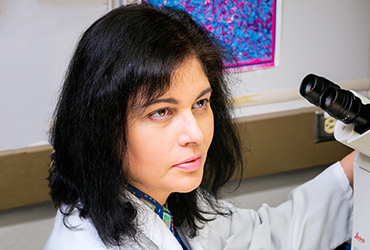From Viruses to a Global View
With a little help from the AACR, a fascination with cancer-associated viruses has turned into a successful career in research for Blossom Damania, PhD, of the University of North Carolina (UNC) at Chapel Hill – a career that has gone global with research projects on four continents.

“My interest in viruses started when I was in graduate school,” she recalls. “I was always fascinated by how a tiny little virus could take over a normal cell and transform it into a cancer cell.”
When she joined the faculty at UNC, she wanted to explore virus questions further, but faced an all-too-common problem: she needed data to get significant funding from the National Institutes of Health (NIH), but where would she get the funding to develop the data?
Viruses in cancer are “kind of a niche area,” she admits. Funding was hard to come by.
She turned to the AACR Gertrude B. Elion Cancer Research Award generously supported by GlaxoSmithKline. A long shot, she thought, but worth trying. She applied and was surprised and delighted to receive a grant.
A Big Impact
“The Gertrude B. Elion Cancer Research Award from AACR in 2004 made a big impact on my career,” she says. “As a junior faculty member, I had not yet received a major NIH grant. Receiving this award meant that I could continue pursuing my research projects on how oncogenic viruses transform normal cells into cancer cells. The grant helped me pursue research avenues that I would not have pursued otherwise. The award was validation that what I worked on was important and mattered.”
Funding in hand, she went to work.
“This grant allowed me to investigate how different viral oncogenic proteins impacted the cells, specifically cell signal transduction pathways. With this award, we were able to demonstrate that Kaposi sarcoma-associated herpes virus (KSHV) activates the PI3K/AKT/mTOR signaling pathway in human cells,” she says.
“We subsequently found, with this award, that several KSHV associated cancers have activated or upregulated the signaling pathway,” Damania says, “and that this pathway is very important for cancer cell survival, be it virus-associated cancers or non-viral cancers.”
She published her findings in articles in AACR’s Cancer Research in 2006 and 2008. With the preliminary data, she applied for a RO1 grant from NIH. She got it and has enjoyed NIH support ever since.
Damania has retained her focus on basic research even as she has risen to be the Boshamer distinguished professor of microbiology and immunology and vice dean for research at UNC School of Medicine.
“Basic science is the discovery part of research,” she says. “If you don’t decipher the basic, fundamental ways in which a cell works or how exactly the immune system works, you won’t know what to target. Basic research is critical to developing strategies that you can use to target and cure diseases.”
Her research work on KSHV-associated cancers has been utilized by other scientists in a more translational way. An AIDS malignancy program funded by the National Cancer Institute took inhibitors of the pathway identified by her research and tested them against KSHV-associated cancers, like Kaposi’s sarcoma. The researchers found the inhibitors were effective in inducing tumor regression in several individuals. The work has progressed to a clinical trial that Damania is watching with interest.
“As basic scientists, we’re really excited when clinicians are interested in what we find and use that in the clinic as the basis for new treatments and cures for cancer patients,” she says.
A Global View
Damania has a global view of cancer. She notes that according to the World Health Organization, the number of cancer cases are expected to double by the year 2040 and that two thirds of this increase will be seen in low- and middle-income countries.
Damania launched the Global Oncology Program (https://unclineberger.org/global-oncology/) at UNC’s Lineberger Cancer Center along with faculty member Dirk Dittmer, PhD, to help address the growing international disparities in cancer incidence and death, including cervical cancer and others linked to viruses.
“Virus-associated cancers are a huge burden in low- and middle-income countries,” she explains. “Many of these cancer related deaths are preventable. Our Global Oncology Program works across many clinical sites, including the United States, but also sites in Africa, like Malawi, Kenya, and Zambia as well as sites in South America (Peru and Brazil), India, and China.
“By studying these cancers globally, we can help the local communities in those pockets around the world, but we can also learn more about these cancers and how to treat them better, and that would have impact on how we treat these cancers in the U.S. as well,” she notes. “By working globally, we can expand knowledge, help others and help ourselves.”
One problem in the low- and middle-income countries, she says, is that they typically lack the healthcare infrastructure needed to support screening and prevention programs. The Global Oncology Program is addressing this need by training junior investigators in low- and middle-income countries in translational research so the work can continue over the long term.
Back at home, Damania has some advice for scientists trying to get their bearings as independent researchers.
“You just have to keep persisting,” she says. “In research and science, there are many rejections along the way — you have your grants rejected, and you have your papers rejected much of the time. But you just have to pick yourself up, dust yourself off, and continue to apply, continue to improve your research program. Persistence is really important, and you can’t let rejection slow you down.”
For further reading:
Immortalization of Primary Endothelial Cells by the K1 Protein of Kaposi’s Sarcoma–Associated Herpesvirus. Ling Wang, Dirk P. Dittmer, Christine C. Tomlinson, Farnaz D. Fakhari and Blossom Damania. DOI: 10.1158/0008-5472.CAN-05-3680. Published April 2006 in Cancer Research.
Kaposi’s Sarcoma–Associated Herpesvirus Confers a Survival Advantage to Endothelial Cells. Ling Wang and Blossom Damania. DOI: 10.1158/0008-5472.CAN-07-5988. Published June 2008 in Cancer Research